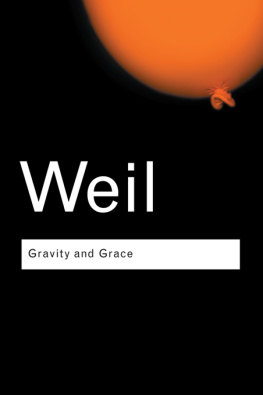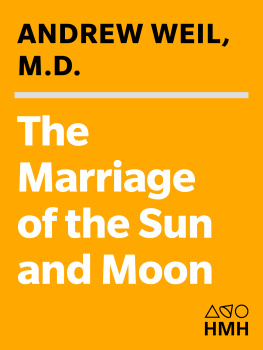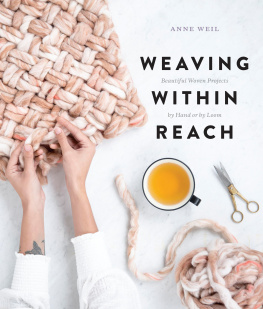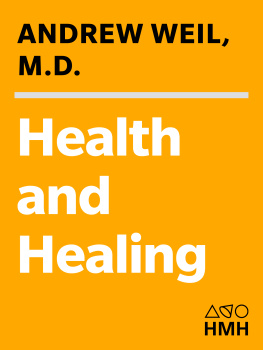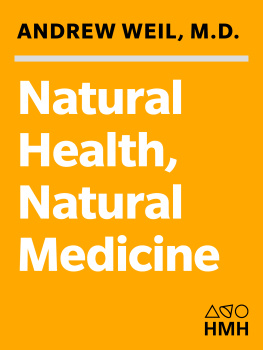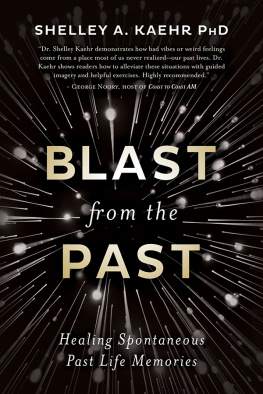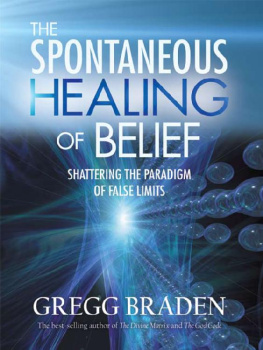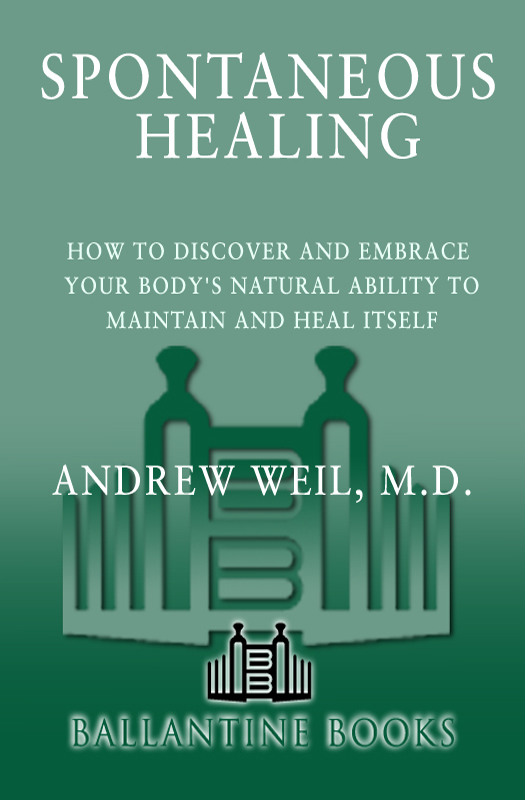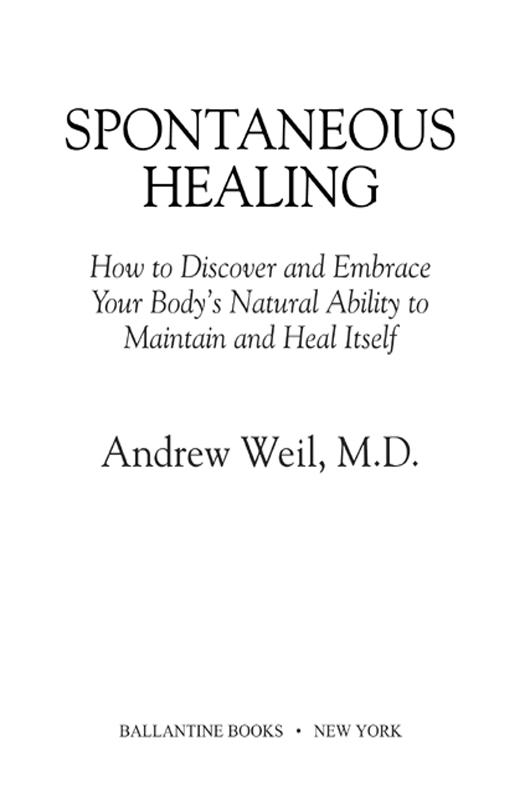Also by Andrew Weil, M.D.:
NATURAL HEALTH, NATURAL MEDICINE:
A Comprehensive Manual for Wellness and Self-Care
HEALTH AND HEALING
FROM CHOCOLATE TO MORPHINE:
Everything You Need to Know About Mind-Altering Drugs (with Winifred Rosen)
THE MARRIAGE OF THE SUN AND MOON:
A Quest for Unity in Consciousness
THE NATURAL MIND:
A New Way of Looking at Drugs and the Higher Consciousness
SPONTANEOUS HEALING:
How to Discover and Enhance Your Bodys Natural Ability to Maintain and Heat Itself *
8 WEEKS TO OPTIMAL HEALTH*
ASK DR. WEIL*
EATING WELL FOR OPTIMUM HEALTH:
The Essential Guide to Food, Diet, and Nutrition
*Published by The Random House Publishing Group
A Ballantine Book
Published by The Random House Publishing Group
Copyright 1995 by Andrew Weil, M.D.
All rights reserved under International and Pan-American Copyright Conventions. Published in the United States by Ballantine Books, an imprint of The Random House Publishing Group, a division of Random House, Inc., New York, and simultaneously in Canada by Random House of Canada Limited, Toronto.
Ballantine and colophon are registered trademarks of Random House, Inc.
www.ballantinebooks.com
Library of Congress Catalog Card Number: 00-100314
eISBN: 978-0-307-79484-0
This edition published by arrangement with Alfred A. Knopf, a division of Random House, Inc.
v3.1_r1
For Diana
C ONTENTS
I NTRODUCTION
A MAN WHOSE lungs are filled with cancer is sent home to die, having been told that medicine can do nothing for him. Six months later he reappears in his doctors office, tumor free. A young womandiabetic, a heavy smokerlies unconscious in a coronary care unit following a bad heart attack. Her doctor anguishes over the fact that her cardiac function is rapidly declining and he is powerless to save her. But the next morning she is awake and talking, clearly on the way to recovery. A neurosurgeon tells grieving parents that their son, who is in a coma following a motorcycle accident and severe head injury, will never regain consciousness. The son is now fine.
Most doctors I know have one or two stories of this sort, stories of spontaneous healing. You will uncover many more of them if you seek them out, yet few medical researchers do. To most doctors, the stories are just stories, not taken seriously, not studied, not looked to as sources of information about the bodys potential to repair itself.
Meanwhile, modern medicine has become so expensive that it is straining the economies of many developed nations and putting itself beyond the reach of much of the worlds population. In many countries politicians argue about how to pay for health care, unaware that a philosophical debate about the very nature of health care has been ongoing throughout history. Doctors believe that health requires outside intervention of one sort or another, while proponents of natural hygiene maintain that health results from living in harmony with natural law. In ancient Greece, doctors worked under the patronage of Asklepios, the god of medicine, but healers served Asklepioss daughter, the radiant Hygeia, goddess of health. Medical writer and philosopher Ren Dubos has written:
For the worshippers of Hygeia, health is the natural order of things, a positive attribute to which men are entitled if they govern their lives wisely. According to them, the most important function of medicine is to discover and teach the natural laws which will ensure a man a healthy mind in a healthy body. More skeptical, or wiser in the ways of the world, the followers of Asklepios believe that the chief role of the physician is to treat disease, to restore health by correcting any imperfections caused by accidents of birth or life.
Political debates about how to cover the costs of medical care mostly take place among followers of Asklepios. There has been no argument about the nature of medicine or peoples expectations of it, only about who is going to pay for its services, which have become inordinately expensive because of doctors reliance on technology. I am a dedicated follower of Hygeia and want to interject that viewpoint into any discussions of the future of medicine.
Let me give an example of how these different philosophies lead to very different courses of action. In the West, a major focus of scientific medicine has been the identification of external agents of disease and the development of weapons against them. An outstanding success in the middle of this century was the discovery of antibiotics and, with that, great victories against infectious diseases caused by bacteria. This success was a major factor in winning hearts and minds over to the Asklepian side, convincing most people that medical intervention with the products of technology was worth it, no matter the cost. In the East, especially in China, medicine has had a quite different focus. It has explored ways of increasing internal resistance to disease so that, no matter what harmful influences you are exposed to, you can remain healthya Hygeian strategy. In their explorations Chinese doctors have discovered many natural substances that have such tonic effects on the body. Although the Western approach has served us well for a number of years, its long-term usefulness may not be nearly so great as the Eastern one.
Weapons are dangerous. They may backfire, causing injury to the user, and they may also stimulate greater aggression on the part of the enemy. In fact, infectious-disease specialists throughout the world are now wringing their hands over the possibility of untreatable plagues of resistant organisms. Just today I received a copy of Clinical Research News for Arizona Physicians, a publication of the university medical center where I teach, that featured an article on Resistance to Antimicrobial Agents: The New Plague? It reads in part:
While antimicrobial agents have been considered the wonder drugs of the 20th century, clinicians and researchers are now acutely aware that microbial resistance to drugs has become a major clinical problem. A variety of solutions have been proposed. The pharmaceutical industry is attempting to develop new agents that are less susceptible to current resistance mechanisms. Unfortunately, the organisms appear to rapidly develop new resistance mechanisms. In the inpatient setting, strict adherence to infection control procedures is essential. Health care workers need to understand that antimicrobial resistance is an accelerating problem in all practice settings that can directly compromise patient outcomes.
The phrase can directly compromise patient outcomes is euphemistic. It means patients will die of infections that doctors formerly could treat with antibiotics. In fact, antibiotics are rapidly losing their power, and some infectious-disease specialists are beginning to think about what we will do when we can no longer rely on them. We might have to revert to methods used in hospitals in the 1920s and 1930s before there were antibiotics: strict quarantine and disinfection, surgical drainage, and so forth. What a reversal that will be for technological medicine!
Meanwhile, resistance does not develop to the tonics of Chinese medicine, because they are not acting against germs (and do not therefore influence their evolution) but rather are acting


